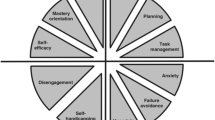Abstract
A perceived lack of engagement of many students in middle years mathematics classes provides a challenge for educators. In this article we report a project that investigated students' perceptions of the extent to which their own efforts influence their achievement at mathematics and their life opportunities. We conducted 2 hour interviews with over 50 students, as well as collecting other data. The results suggest that a student's orientation to learning mathematics is not predicted by their achievement. Even students who were confident, successful and persistent exhibited short-term goals. It seems that classroom culture may be an important determinant of under-participation in schooling.
Similar content being viewed by others
References
Australian Curriculum Studies Association: 1996, From Alienation to Engagement: Opportunities for Reform in the Middle Years of Schooling (Vol. 1-3), ACSA, Canberra.
Ball, D.L.: 1988, ‘Unlearning to teach mathematics’, For the Learning of Mathematics 8(1), 40–48.
Bandura, A.: 1997, Self Efficacy: The Exercise of Control, W.H. Freeman, New York.
Bishop, A.J.: 2001, ‘What values do you teach when you teach mathematics?’ in P. Gates (ed.), Issues in Mathematics Teaching, Routledge Falmer, London, pp. 93–104.
Brophy, J.: 1983, ‘Research on the self-fulfilling prophecy and teacher expectations’, Journal of Educational Psychology 75(5), 631–661.
Brophy, J.: 1986, ‘Teaching and learning mathematics. Where research should be going’, Journal for Research in Mathematics Education 17(8), 323–346.
Dweck, C.S.: 2000, Self, Theories: Their Role in Motivation, Personality, and Development, Psychology Press, Philadelphia.
Eccles, J.S. and Templeton, J.: 2002, ‘Extracurricular and other after-school activities for youth’, Review of Research in Education 26, 113–180.
Hannula, M.: 2004, Affect in Mathematical Thinking and Learning, Turun Yliopisto, Turku.
Hill, P., Holmes-Smith, P. and Rowe, K.: 1993, School and Teacher Effectiveness in Victoria: Key Findings from Phase 1 of the Victorian Quality Schools Project, Centre for Applied Educational Research, Melbourne.
Leder, G., Pehkonen, E. and Torner, G.: 2002, Beliefs: A Hidden Variable in Mathematics Education, Kluwer, Dordrecht.
Lokan, J., Greenwood, L. and Cresswell, J.: 2001, 15-up and Counting, Reading, Writing, Reasoning. How Literate are Australia's Students? Australian Council for Educational Research, Melbourne.
McComb, B.L. and Pope, J.E.: 1994, Motivating Hard to Reach Students, American Psychological Association, Washington.
McGaw, B.: 2004, ‘Australian mathematics learning in an international context’, in I. Putt, R. Farragher and M. McLean (eds.), Mathematics Education for the Third Millennium: Towards 2010. Proceedings of the 27th annual conference of the Mathematics Education Research Group of Australasia, Townsville, p. 29.
McLeod, D.B. and Adams, V.M.: 1989, Affect and Problem Solving, Springer-Verlag, New York.
Middleton, J.A.: 1995, ‘A study of intrinsic motivation in the mathematics classroom: A personal construct approach’, Journal for Research in Mathematics Education 26(3), 254–279.
Pajares, M.F.: 1992, ‘Teachers’ beliefs and educational research: Cleaning up a messy construct, Review of Educational Research 62(3), 307–332.
Skemp, R.R.: 1976, ‘Relational and instrumental understanding’, Mathematics Teaching 77, 20–26.
Sullivan, P., Zevenbergen, R. and Mousley, J.: 2002, ‘Contexts in mathematics teaching: Snakes or ladders?’, in B. Barton, K. C. Irwin, M. Pfannkuch and M. Thomas (eds.), Mathematics Education in the South Pacific. Proceedings of the 27th annual conference of the Mathematics Education Research Group of Australasia, Townsville, pp. 649–656.
Tomlinson, C.A.: 2001, How to Differentiate Instruction in Mixed Ability Classrooms, Association for Supervision and Curriculum Development, Virginia.
Author information
Authors and Affiliations
Corresponding author
Rights and permissions
About this article
Cite this article
Sullivan, P., Tobias, S. & McDonough, A. Perhaps the Decision of Some Students not to Engage in Learning Mathematics in School is Deliberate. Educ Stud Math 62, 81–99 (2006). https://doi.org/10.1007/s10649-006-1348-8
Published:
Issue Date:
DOI: https://doi.org/10.1007/s10649-006-1348-8




